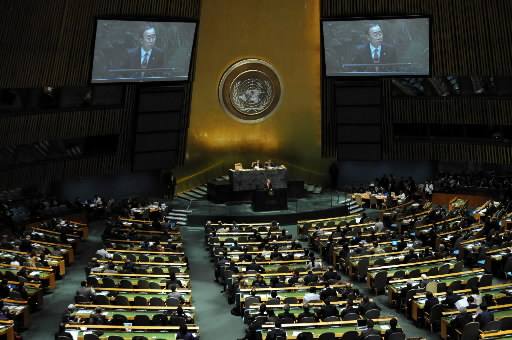Nuclear Weapons Can Be Eliminated: Chapter 12, Part 6
Jun. 24, 2010
Chapter 12: Opening the Door to Abolition
Part 6: A-bombed nation's responsibility to act
by the "Nuclear Weapons Can Be Eliminated" Reporting Team
On June 17, the Democratic Party of Japan (DPJ), the main ruling party, and the Liberal Democratic Party of Japan (LDP), the main opposition, released their manifestos for the upcoming Upper House election. In the area of diplomacy and security, the DPJ has proposed reducing the number of nuclear weapons in the world, the early realization of nuclear-related treaties, and the denuclearization of Northeast Asia as measures to advance "a world without nuclear weapons."
Last summer the DPJ achieved a historic change of government in the general election. At the time, Yukio Hatoyama, who assumed the post of prime minister, declared: "We will lead the effort to eliminate nuclear weapons." At the U.N. Security Council Summit, convened by U.S. President Barack Obama at the end of September, Mr. Hatoyama stressed anew his administration's resolve to lead the world toward nuclear abolition in the speech he made at the gathering. He mentioned Japan's "moral responsibility" as "the only victim of nuclear bombings."
Marked by safe statements
Mr. Hatoyama's statement was indeed a departure from the LDP-led government -- which often referred to "the ultimate goal of nuclear abolition" as a diplomatic aim with no prospect in sight for its realization -- as well as an appeal for change.
However, Mr. Hatoyama was not present at the Nuclear Non-proliferation Treaty (NPT) Review Conference this past May, a perfect occasion to "lead the effort to eliminate nuclear weapons." Moreover, Mr. Hatoyama ended up stepping down from his position as prime minister without having provided a credible explanation for the fact that the nation continues to depend on the U.S. nuclear umbrella for its security while simultaneously appealing for nuclear abolition.
Many A-bomb survivors (hibakusha) pinned their hopes on Foreign Minister Katsuya Okada, too, who assumed his post with the advent of the new administration last year, as Mr. Okada serves as chair of the group "DPJ Parliamentarians for Disarmament Promotion," announced a draft of a treaty for a nuclear-weapon-free zone for Northeast Asia in the city of Nagasaki in August two years ago, and was also enthusiastic about seeking a declaration of the no-first-use of nuclear weapons by the nuclear weapon states.
It is true that Mr. Okada, at the G8 Summit of Foreign Ministers this past March, called strongly on the nuclear weapon states to reduce the role of nuclear weapons in their security policies. However, there is no denying that his safe, official statements about nuclear arms have been conspicuous since he became foreign minister, including his remark calibrating his call for the no-first-use declaration as a "personal view."
At a news conference on June 4, Mr. Okada said, "A nuclear-weapon-free zone treaty for Northeast Asia and the declaration of the no-first-use of nuclear weapons cannot become realities at once. These ideas are unrealistic, unless the role of nuclear weapons is reduced and North Korea's nuclear issues are resolved first."
Meanwhile, the LDP's manifesto for the Upper House election includes such language as "We will pursue realistic and concrete efforts in the area of nuclear disarmament" and "We will begin fundamental discussion about Japan's nuclear deterrence policy and establish a basic policy."
During a question-and-answer portion of the Upper House plenary session on June 15, Naoto Kan, who now serves as the new leader of the A-bombed nation of Japan, commented, "As the only nation to have experienced atomic bombings, we would like to take the initiative and exercise leadership in pursuit of a world without nuclear weapons."
Lack of concrete measures
Statements made by statesmen should carry weight. But such statements by Japanese officials with regard to nuclear abolition sound insubstantial, given the lack of concrete measures taken. How will Japan tackle the challenges of leaving the U.S. nuclear umbrella and denuclearizing Northeast Asia, both of which are prerequisites to nuclear abolition? No action to address these matters can be seen.
How will the government of the A-bombed nation respond to the wish of the hibakusha that the abolition of nuclear weapons will be achieved while they are still alive?
(Originally published on June 19, 2010)








